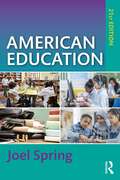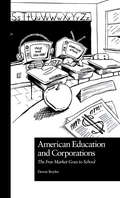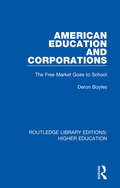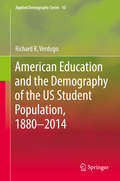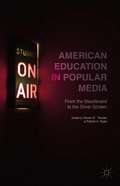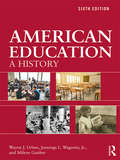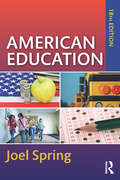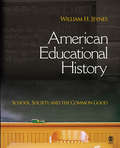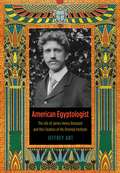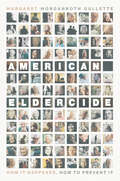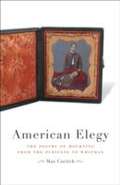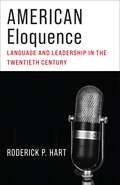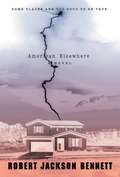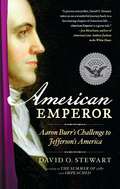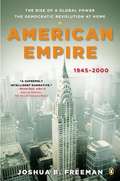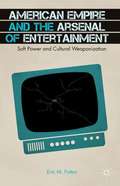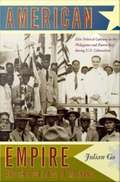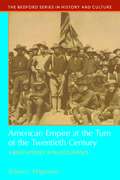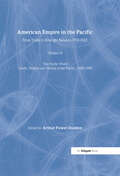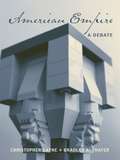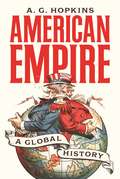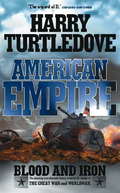- Table View
- List View
American Education (Sociocultural, Political, and Historical Studies in Education)
by Joel SpringFeaturing current information and challenging perspectives on the latest issues and forces shaping the American educational system—with scholarship that is often cited as a primary source—Joel Spring introduces readers to the historical, political, social and legal foundations of education and to the profession of teaching in the United States. In his signature straightforward, concise approach to describing complex issues, he illuminates events and topics that are often overlooked or whitewashed, giving students the opportunity to engage in critical thinking about education. Students come away informed on the latest topics, issues and data and with a strong knowledge of the forces shaping the American educational system. Updated throughout, the 21st edition of this clear, authoritative text remains fresh and up-to-date, reflecting the many changes in education that have occurred since the publication of the previous edition. New coverage includes: Discussion of “culture wars” and critical race theory Parental rights versus the goals of common education LGBTQIA+ students’ rights Discussion of the current administration’s educational policies
American Education and Corporations: The Free Market Goes to School (Pedagogy and Popular Culture #2)
by Deron BoylesThis work argues that private businesses use public schools as worker training sites, resulting in a devalued teaching force, students as uncritical consumers, and schools as economic markets. Boyles analyzes school-business partnerships, revealing false philanthropy and the ulterior motives behind fast-food reading campaigns and supermarket sales for schools promotions. This important book criticizes the practice of privatization itself, revealing it to be a conservative gambit to secure class differences, and not a simple extension of free market business influence into the public sector.
American Education and Corporations: The Free Market Goes to School (Routledge Library Editions: Higher Education #2)
by Deron BoylesOriginally published in 1998, American Education and Corporations, provides a detailed study of the effects of commercialisation on the public school system. The book provides a powerful indictment of corporate culture and its influence on American public schooling, within a clear theoretical framework. The book looks at the threat of corporate culture to public education and advocates an understanding of the democratic importance of schooling as a public good.
American Education and the Demography of the US Student Population, 1880–2014 (Applied Demography Series #10)
by Richard R. VerdugoThis monograph examines changes in the American public school population from 1900 to 2010. It shows how different historical periods have affected the composition of the student body and have posed important challenges to those involved in shaping educational policy. The author first develops an analytical framework that merges education and applied demography concepts. The education concepts include attendance, promotion, retention, high school graduation, and college enrollment. While, the applied demography concepts take into account size, distribution, and composition. He then applies this framework to the four most recent American historical periods: the Progressive Era, the Great Depression, the Post WWII Era, and the Post 1983 Era. Readers will come to understand the changing socio-demographic profile of American schools due to such factors as immigration from Europe, child labor laws, internal migration, greater fertility and the rise of the Baby Boom generation, the changing status of women and minorities, the urban crises, rising social inequality, the 2008 recession, and globalization. Featuring both historical and current data, this volume clearly shows how demographic change affects the teaching and learning environment, education policy, funding, and school segregation. Overall, it offers insightful analysis that may help shape the future of American education.
American Education in Popular Media
by Sevan G. Terzian Patrick A. RyanAmerican Education in Popular Media examines how popular media including mass magazines, radio, film, and television have represented schooling in the United States over the course of the twentieth century. Historical essays explore prevalent portrayals of students and professional educators while addressing contested purposes of schooling in American society. Terzian and Ryan highlight the educative and normative dimensions of popular media in outlining roles for teachers, students, and administrators at educational institutions ranging from elementary schools to universities.
American Education: A History (Patterson's American Education Ser.)
by Wayne Milton Gaither Jennings J. Urban L. WagonerThis is a lively account of one of the most important and overlooked themes in American education. Beginning in the colonial period and working to the present, Gaither describes in rich detail how the home has been used as the base for education of all kinds. The last five chapters focus especially on the modern homeschooling movement and offer the most comprehensive and authoritative account of it ever written. Readers will learn how and why homeschooling emerged when it did, where it has been, and where it may be going.
American Education: From The Puritans To The Trump Era (Sociocultural, Political, and Historical Studies in Education)
by Joel SpringFeaturing current information and challenging perspectives on the latest issues and forces shaping the American educational system—with scholarship that is often cited as a primary source, Joel Spring introduces readers to the historical, political, social, and legal foundations of education and to the profession of teaching in the United States. In his signature straightforward, concise approach to describing complex issues, he illuminates events and topics that are often overlooked or whitewashed, giving students the opportunity to engage in critical thinking about education. Students come away informed on the latest topics, issues, and data and with a strong knowledge of the forces shaping the American educational system. Thoroughly updated throughout, the 18th edition of this clear, authoritative text remains fresh and up to date, reflecting the many changes in education that have occurred since the publication of the previous edition. Topics and issues addressed and analyzed include • The decline of the Common Core State Standards, particularly as result of a Republican-controlled administration currently in place • Increasing emphasis on for-profit education, vouchers, charter schools and free-market competition between schools, expected to surge with the appointment of the new U.S. Secretary of Education Betsy DeVos • Current debates about immigration and "Dreamers"—new statistics on immigrant education, discussion of education proposals to accommodate the languages, cultures and religions of newly arrived immigrants • New education statistics on school enrollments, dropouts, education and income, school segregation, charter schools and home languages • The purposes of education as presented in the 2016 platforms of the Republican, Democratic, Green, and Libertarian parties • Discussions around transgender students
American Educational History: School, Society, and the Common Good
by William H. JeynesAmerican Educational History: School, Society, and the Common Good is an up-to-date, contemporary examination of historical trends that have helped shape schools and education in the United States. Author William H. Jeynes places a strong emphasis on recent history, most notably post-World War II issues such as the role of technology, the standards movement, affirmative action, bilingual education, undocumented immigrants, school choice, and much more!
American Egyptologist: The Life of James Henry Breasted and the Creation of His Oriental Institute
by Jeffrey AbtJames Henry Breasted (1865-1935) had a career that epitomizes our popular image of the archaeologist. Daring, handsome, and charismatic, he traveled on expeditions to remote and politically unstable corners of the Middle East, helped identify the tomb of King Tut, and was on the cover of Time magazine. But Breasted was more than an Indiana Jones--he was also an accomplished scholar, academic entrepreneur, and talented author who brought ancient history to life not just for students but for such notables as Teddy Roosevelt and Sigmund Freud. In American Egyptologist, Jeffrey Abt weaves together the disparate strands of Breasted's life, from his small-town origins following the Civil War to his evolution into the father of American Egyptology and the founder of the Oriental Institute in the early years of the University of Chicago. Abt explores the scholarly, philanthropic, diplomatic, and religious contexts of his ideas and projects, providing insight into the origins of America's most prominent center for Near Eastern archaeology. An illuminating portrait of the nearly forgotten man who demystified ancient Egypt for the general public, American Egyptologist restores James Henry Breasted to the world and puts forward a brilliant case for his place as one of the most important scholars of modern times.
American Egyptologist: The Life of James Henry Breasted and the Creation of His Oriental Institute
by Jeffrey AbtJames Henry Breasted (1865–1935) had a career that epitomizes our popular image of the archaeologist. Daring, handsome, and charismatic, he traveled on expeditions to remote and politically unstable corners of the Middle East, helped identify the tomb of King Tut, and was on the cover of Time magazine. But Breasted was more than an Indiana Jones—he was an accomplished scholar, academic entrepreneur, and talented author who brought ancient history to life not just for students but for such notables as Teddy Roosevelt and Sigmund Freud.In American Egyptologist, Jeffrey Abt weaves together the disparate strands of Breasted’s life, from his small-town origins following the Civil War to his evolution into the father of American Egyptology and the founder of the Oriental Institute in the early years of the University of Chicago. Abt explores the scholarly, philanthropic, diplomatic, and religious contexts of his ideas and projects, providing insight into the origins of America’s most prominent center for Near Eastern archaeology. An illuminating portrait of the nearly forgotten man who demystified ancient Egypt for the general public, American Egyptologist restores James Henry Breasted to the world and puts forward a brilliant case for his place as one of the most important scholars of modern times.
American Eldercide: How It Happened, How to Prevent It
by Margaret Morganroth GulletteA bracing spotlight on the avoidable causes of the COVID-19 Eldercide in the United States. Twenty percent of the Americans who have died of COVID since 2020 have been older and disabled adults residing in nursing homes—even though they make up fewer than one percent of the US population. Something about this catastrophic loss of life in government-monitored facilities has never added up. Until now. In American Eldercide, activist and scholar Margaret Morganroth Gullette investigates this tragic public health crisis with a passionate voice and razor-sharp attention to detail, showing us that nothing about it was inevitable. By unpacking the decisions that led to discrimination against nursing home residents, revealing how governments, doctors, and media reinforced ageist or ableist biases, and collecting the previously little-heard voices of the residents who survived, Gullette helps us understand the workings of what she persuasively calls an eldercide. Gullette argues that it was our collective indifference, fueled by the heightened ageism of the COVID-19 era, that prematurely killed this vulnerable population. Compounding that deadly indifference is our own panic about aging and a social bias in favor of youth-based decisions about lifesaving care. The compassion this country failed to muster for the residents of our nursing facilities motivated Gullette to pen an act of remembrance, issuing a call for pro-aging changes in policy and culture that would improve long-term care for everyone.
American Electric Power: Facing the Challenges of Distributed Generation
by Richard H.K. Vietor Hilary WhiteAmerican Electric Power, like most utilities in the USA, is currently exposed to distributed generation and the problem of net-metering. Solar installations in particular have been heavily subsidized, by the state and by regulation, which does not allow grid operators to to recover their fixed costs. This results in stranded assets and cross-subsidies from poor to rich.
American Electric Power: Facing the Challenges of Distributed Generation
by Richard H.K. Vietor Hilary WhiteAmerican Electric Power, like most utilities in the USA, is currently exposed to distributed generation and the problem of net-metering. Solar installations in particular have been heavily subsidized, by the state and by regulation, which does not allow grid operators to to recover their fixed costs. This results in stranded assets and cross-subsidies from poor to rich.
American Elegy: The Poetry of Mourning from the Puritans to Whitman
by Max CavitchPracticed and read form of verse in America, "elegies are poems about being left behind," writes Max Cavitch. American Elegy is the history of a diverse people's poetic experience of mourning and of mortality's profound challenge to creative living.
American Eloquence: Language and Leadership in the Twentieth Century
by Roderick P. HartWhat makes political speech powerful? How does eloquent rhetoric transcend ordinary language? Which stylistic choices allow effective orators to stir emotions and spur action? And in the age of Donald Trump, does political eloquence still matter?This book examines a wide swath of political discourse to shed new light on the meaning and significance of eloquence. Roderick P. Hart, a leading scholar of political communication, develops new ways of measuring persuasiveness and rhetorical power through the use of computer-based methods. He examines one hundred of the most important speeches of the twentieth century, given by presidents and politicians as well as leaders, activists, and cultural figures including Martin Luther King Jr., Lou Gehrig, Mario Savio, Carrie Chapman Catt, and Stokely Carmichael.Deploying the tools of the digital humanities as well as critical rhetorical analysis, Hart considers what distinguishes the linguistic properties of iconic oratory from those of more mundane texts. He argues that eloquence represents the confluence of cultural resonance, personal investment, and poetic imagination, providing empirical metrics for assessing each of these qualities. A quantitative and qualitative exploration of American political speech, this interdisciplinary book offers a powerful argument for why eloquence is essential for a functioning democracy.
American Elsewhere
by Robert Jackson BennettSome places are too good to be true.Under a pink moon, there is a perfect little town not found on any map. In that town, there are quiet streets lined with pretty houses, houses that conceal the strangest things. After a couple years of hard traveling, ex-cop Mona Bright inherits her long-dead mother's home in Wink, New Mexico. And the closer Mona gets to her mother's past, the more she understands that the people of Wink are very, very different ...From one of our most talented and original new literary voices comes the next great American supernatural novel: a work that explores the dark dimensions of the hometowns and the neighbors we thought we knew.
American Emperor: Aaron Burr's Challenge to Jefferson's America
by David O. StewartIn this vivid and brilliant biography, David Stewart describes Aaron Burr, the third vice president, as a daring and perhaps deluded figure who shook the nation’s foundations in its earliest, most vulnerable decades. In 1805, the United States was not twenty years old, an unformed infant. The government consisted of a few hundred people. The immense frontier swallowed up a tiny army of 3,300 soldiers. Following the Louisiana Purchase, no one even knew where the nation’s western border lay. Secessionist sentiment flared in New England and beyond the Appalachians. Burr had challenged Jefferson, his own running mate, in the presidential election of 1800. Indicted for murder in the dueling death of Alexander Hamilton in 1804, he dreamt huge dreams. He imagined an insurrection in New Orleans, a private invasion of Spanish Mexico and Florida, and a great empire rising on the Gulf of Mexico, which would swell when America’s western lands seceded from the Union. For two years, Burr pursued this audacious dream, enlisting support from the General-in-Chief of the Army, a paid agent of the Spanish king, and from other western leaders, including Andrew Jackson. When the army chief double-crossed Burr, Jefferson finally roused himself and ordered Burr prosecuted for treason. The trial featured the nation’s finest lawyers before the greatest judge in our history, Chief Justice John Marshall, Jefferson’s distant cousin and determined adversary. It became a contest over the nation’s identity: Should individual rights be sacrificed to punish a political apostate who challenged the nation’s very existence? In a revealing reversal of political philosophies, Jefferson championed government power over individual rights, while Marshall shielded the nation’s most notorious defendant. By concealing evidence, appealing to the rule of law, and exploiting the weaknesses of the government’s case, Burr won his freedom. Afterwards Burr left for Europe to pursue an equally outrageous scheme to liberate Spain’s American colonies, but finding no European sponsor, he returned to America and lived to an unrepentant old age. Stewart’s vivid account of Burr’s tumultuous life offers a rare and eye-opening description of the brand-new nation struggling to define itself.
American Empire
by Eric Foner Joshua FreemanA landmark history of postwar America and the second volume in the Penguin History of the United States series In this momentous work, acclaimed labor historian Joshua B. Freeman presents an epic portrait of the United States in the latter half of the twentieth century, revealing a nation galvanized by change even as conflict seethed within its borders. Beginning in 1945, he charts the astounding rise of the labor movement and its pitched struggle with the bastions of American capitalism in the 1940s and '50s, untangling the complicated threads between the workers' agenda and that of the civil rights and women's movements. Through the lens of civil rights, the Cold War struggle, and the labor movement, American Empire teaches us something profound about our past while illuminating the issues that continue to animate American political discourse today. world.
American Empire and the Arsenal of Entertainment
by Eric M. FattorMovies, television, and American culture permeates even the most remote reaches of the globe in unprecedented levels. What affect does the spread of the American zeitgeist have on global perceptions of the US? This book analyzes the complex role entertainment plays in foreign policy - weighing its benefits and setbacks to national interests abroad.
American Empire and the Politics of Meaning: Elite Political Culture in the Philippines and Puerto Rico During U.S. Colonialism
by Julian GoWhen the United States took control of the Philippines and Puerto Rico in the wake of the Spanish-American War, it declared that it would transform its new colonies through lessons in self-government and the ways of American-style democracy. In both territories, U. S. colonial officials built extensive public school systems, and they set up American-style elections and governmental institutions. The officials aimed their lessons in democratic government at the political elite: the relatively small class of the wealthy, educated, and politically powerful within each colony. While they retained ultimate control for themselves, the Americans let the elite vote, hold local office, and formulate legislation in national assemblies. American Empire and the Politics of Meaning is an examination of how these efforts to provide the elite of Puerto Rico and the Philippines a practical education in self-government played out on the ground in the early years of American colonial rule, from 1898 until 1912. It is the first systematic comparative analysis of these early exercises in American imperial power. The sociologist Julian Go unravels how American authorities used "culture" as both a tool and a target of rule, and how the Puerto Rican and Philippine elite received, creatively engaged, and sometimes silently subverted the Americans' ostensibly benign intentions. Rather than finding that the attempt to transplant American-style democracy led to incommensurable "culture clashes," Go assesses complex processes of cultural accommodation and transformation. By combining rich historical detail with broader theories of meaning, culture, and colonialism, he provides an innovative study of the hidden intersections of political power and cultural meaning-making in America's earliest overseas empire.
American Empire at the Turn at the Twentieth Century: A Brief History with Documents
by Kristin HogansonThis volume introduces students to primary documents on American empire from a pivotal era of U. S. expansion beyond the North American continent in the late-nineteenth and early-twentieth centuries. Along with covering a wide range of places-including Cuba, Puerto Rico, and the Philippines--the documents touch on a wide range of themes, among them race, citizenship, civilization, democracy, cross-cultural encounter, and self-determination. Kristin Hoganson's introduction provides the context essential to understanding this period and the ways in which the echoes of 1898 still reverberate today, including in the reach of U. S. power and the composition of the American people. Through a collection of sources representing the voices of those living under imperial rule as well as those imposing and opposing it, students can consider the American imperial endeavors. Document headnotes, maps, a Chronology of American Empire in the Caribbean and the Pacific, Questions for Consideration, and a Selected Bibliography provide pedagogical support.
American Empire in the Pacific: From Trade to Strategic Balance, 1700-1922 (The Pacific World: Lands, Peoples and History of the Pacific, 1500-1900 #9)
by Arthur Power DuddenAmerican Empire in the Pacific explores the empire that emerged from the Oregon Treaty of 1846 with Great Britain and the outcome of the Mexican War in 1848. Together, they signalled the mastery of the United States over the continent of North America; the Pacific Ocean and the ancient civilizations of Asia at last lay within reach. England's East India Company in the 17th and 18th centuries had introduced Asian wares including tea to the American colonists, but wars against France and then the struggle for American independence held back expansion by Yankee entrepreneurs until 1783. Thereafter, from the Atlantic seaboard, American ships began regularly to reach China. Merchants, sailors and missionaries, motivated toward trade and redemption like the Europeans they met along the way, encountered the exotic peoples and cultures of the Pacific. Would-be empire builders projected a manifest destiny without limits. Russian Alaska, the native kingdom of Hawai'i, Japan, Korea, Samoa, and Spain's Philippine Islands, as well as a transcontinental railroad and an isthmian canal, acquired strategic significance in American minds, in time to outweigh both commerce and conversion.
American Empire: A Debate
by Christopher Layne Bradley A. ThayerIn this short, accessible book Layne and Thayer argue the merits and demerits of an American empire. With few, if any, rivals to its supremacy, the United States has made an explicit commitment to maintaining and advancing its primacy in the world. But what exactly are the benefits of American hegemony and what are the costs and drawbacks for this fledgling empire? After making their best cases for and against an American empire, subsequent chapters allow both authors to respond to the major arguments presented by their opponents and present their own counter arguments.
American Empire: A Global History (America in the World #25)
by A. G. HopkinsA new history of the United States that turns American exceptionalism on its headAmerican Empire is a panoramic work of scholarship that presents a bold new global perspective on the history of the United States. Drawing on his expertise in economic history and the imperial histories of Britain and Europe, A. G. Hopkins takes readers from the colonial era to today to show how, far from diverging, the United States and Western Europe followed similar trajectories throughout this long period, and how America’s dependency on Britain and Europe extended much later into the nineteenth century than previously understood.In a sweeping narrative spanning three centuries, Hopkins describes how the revolt of the mainland colonies was the product of a crisis that afflicted the imperial states of Europe generally, and how the history of the American republic between 1783 and 1865 was a response not to the termination of British influence but to its continued expansion. He traces how the creation of a U.S. industrial nation-state after the Civil War paralleled developments in Western Europe, fostered similar destabilizing influences, and found an outlet in imperialism through the acquisition of an insular empire in the Caribbean and Pacific. The period of colonial rule that followed reflected the history of the European empires in its ideological justifications, economic relations, and administrative principles. After 1945, a profound shift in the character of globalization brought the age of the great territorial empires to an end.American Empire goes beyond the myth of American exceptionalism to place the United States within the wider context of the global historical forces that shaped the Western empires and the world.
American Empire: Blood and Iron
by Harry TurtledoveThe first volume of the American Empire trilogy from Harry Turtledove, "The Wizard of If".As Turtledove's brilliant series The Great War came to its end, the United States of America, in alliance with Germany, had defeated Great Britain, France and the Confederate States of America in a bloody conflict known as the First World War.Now as the 1920s begin, though, the seeds of a new conflict have already been sown. The United States, led by Theodore Roosevelt, swings wildly towards socialism. In Canada - now a US colony - nationalist terrorists strike against the new American oppressors. But it is in the Confederacy, trapped in a ruinous economic depression, where fascism begins to spread, and the fires are fanned by a charismatic leader who may again plunge the world into war.
